|
|
|
Sort Order |
|
|
|
Items / Page
|
|
|
|
|
|
|
| Srl | Item |
| 1 |
ID:
145197
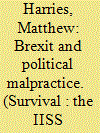

|
|
|
|
|
| Summary/Abstract |
David Cameron is a weak prime minister leading a divided government. The peculiar thing about this assertion is that it is probably more valid now than it was when Cameron was in charge of a two-party coalition, an extreme rarity in British politics. In May 2015 Cameron won an extraordinary general-election victory, becoming the first full-term incumbent prime minister since 1832 to increase his party’s share of the vote and its total number of seats in the House of Commons. He returned as prime minister having shed his coalition partners, the Liberal Democrats, who were beaten almost out of political existence. In the following months, Labour proceeded to elect as leader a veteran MP drawn from the party’s hard left, Jeremy Corbyn, who duly appointed as his shadow chancellor a backbench colleague, John McDonnell, who in 2006 had described his greatest intellectual influences as Lenin, Marx and Trotsky.1 Corbyn told the BBC he would never, under any circumstances, use Britain’s nuclear weapons – thereby breaking the taboo, based on Labour’s electoral annihilation in the 1980s, that the party should leave unilateral disarmament well alone – and McDonnell, having declared his plan for the British economy to be ‘socialism with an iPad’, quoted from Mao’s little red book on the floor of the House of Commons.2 Meanwhile, the rapid rise of the Scottish National Party north of the border had cost Labour more than 50 seats, and with the Conservatives dominant in England, there was a reasonable chance that the Labour Party would never again find itself in a position to command a parliamentary majority.
|
|
|
|
|
|
|
|
|
|
|
|
|
|
|
|
| 2 |
ID:
110292
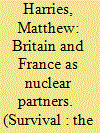

|
|
|
|
|
| Publication |
2012.
|
| Summary/Abstract |
In November 2010, as part of a broad-ranging bilateral defence agreement, the United Kingdom and France signed a treaty providing for limited cooperation on nuclear weapons. Modest in scope, and the product in immediate terms of economic pressure, the nuclear treaty's main substantive provision is for the joint construction of radiographic-hydrodynamic facilities. Beneath the surface of this treaty, however, lies a story of significant strategic shifts, and there are intriguing possibilities for future collaboration between the UK and France, and perhaps for trilateral cooperation involving the United States.
The potential for UK-French collaboration spans the spectrum of nuclear-weapons issues, from technology to policy, and perhaps to operational matters. These possibilities are sensitive, not only because they run into the everyday difficulties of political-military relations between the countries, but also for their relevance to two current debates: the ongoing battle over renewing the UK's fleet of strategic nuclear submarines, and international demands for multilateral nuclear disarmament.
|
|
|
|
|
|
|
|
|
|
|
|
|
|
|
|
| 3 |
ID:
148356
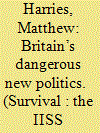

|
|
|
|
|
| Summary/Abstract |
The challenges of negotiating Brexit are daunting. As such, it does not bode well that Britain's post-referendum politics have been so bitter, polarised and volatile.
|
|
|
|
|
|
|
|
|
|
|
|
|
|
|
|
| 4 |
ID:
158016
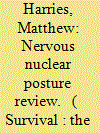

|
|
|
|
|
| Summary/Abstract |
The 2018 US Nuclear Posture Review (NPR), released on 2 February, contains troubling recommendations to broaden the role of nuclear weapons in American strategy, but omits more radical options that some observers had anticipated. Overall, it feels more swamp than Trump – that is, it gives the impression of having been written by informed professionals within the mainstream of US national-security thinking, albeit clearly at the hawkish end of that spectrum.
|
|
|
|
|
|
|
|
|
|
|
|
|
|
|
|
| 5 |
ID:
179828
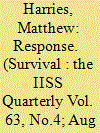

|
|
|
|
|
| Summary/Abstract |
Taking a sledgehammer to one of the few remaining foundations of the arms-control regime, flawed though it is, would be reckless.
|
|
|
|
|
|
|
|
|
|
|
|
|
|
|
|
| 6 |
ID:
093083
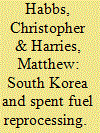

|
|
|
|
|
|
|
|